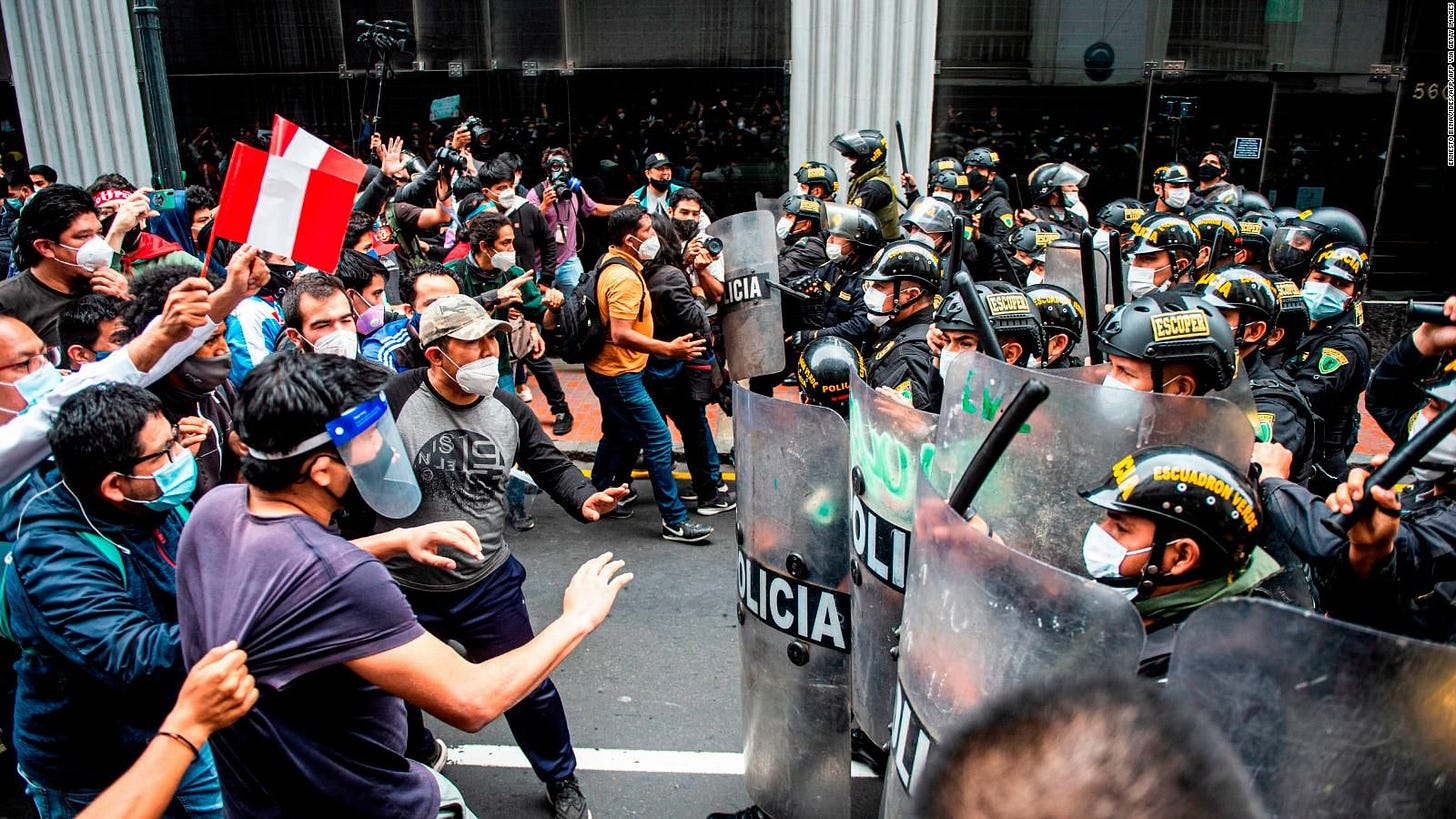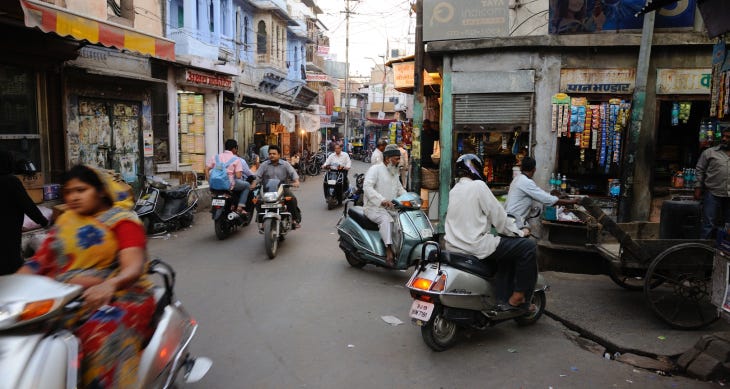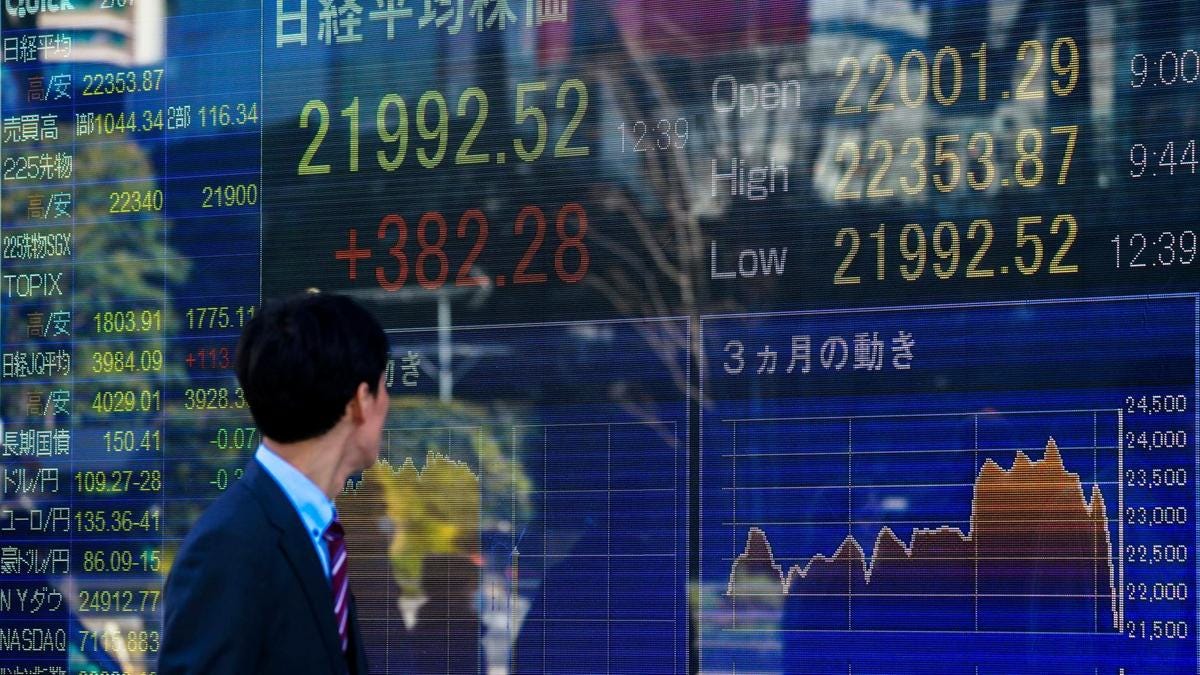Emerging Markets Daily - April 5
Peru Imposes Curfew As Protests Spiral, India EV Sales Rising, Sri Lanka Finance Min Steps Down Amid Protests, EM Suffers $9.8 B Outflows, Oman Prepares for EM Status
The Top 5 Stories Shaping Emerging Markets from Global Media - April 5
Peru President Imposes a Lima Curfew to Curb Protests
Reuters
“Peruvian President Pedro Castillo imposed a curfew in the capital, Lima, on Tuesday, banning people from leaving their homes in an attempt to curb protests against rising fuel and fertilizer costs that have spread throughout the country.”
“On Monday, a wave of protests against rising fuel and fertilizer prices, triggered by Russia's invasion of Ukraine, continued into their second week, while the government scrambled to bring prices down.”
“The protests represent a harsh reality for the embattled presidency of leftist Pedro Castillo, a peasant farmer and school teacher who won election last year with the overwhelming support of the rural poor.”
“But his support has quickly waned, even in rural regions, and hovers at about 25% nationwide. In his eight months in office, Castillo has survived two impeachment attempts and cycled through an unprecedented number of Cabinet members.”
“The protests have become increasingly violent and at least four people have been killed, the government said. On Monday, protesters burned toll booths and clashed with police near the southern city of Ica.” Reuters reports.
India EV Sales Doubling, Led by Battery-Powered Scooters
Bloomberg
“Retail sales in India of electric vehicles led by battery-powered scooters and rickshaws will almost double in the current fiscal year started April 1 as demand for such transportation picks up, according to a dealers’ body.”
“As many as 800,000 electric vehicles will be sold in India in the year through March 2023, compared with 429,217 units in the previous period, Vinkesh Gulati, president of the Federation of Automobile Dealers Associations, said at an event Tuesday. Two-wheelers clocked sales of 231,338 units in 2022.”
“The switch to clean transport in the South Asian nation is slower than other countries such as China and the U.S. By 2040, just 53% of new automobile sales in India will be electric, compared with 77% in China, according to BloombergNEF. Expensive price tags, lack of options in electric models and insufficient charging stations have led to sluggish adoption of battery vehicles in India.”
“India’s electric transition is ‘marred’ by a slow increase in production capacity, even though demand is rising, Gulati said. Electric vehicle sales can cross 1 million units next year if automakers scale-up capacity, he said.” Ragini Saxena reports.
Sri Lanka Finance Minister Quits As Crisis Builds and Protests Grow
Hindustan Times
“Sri Lanka finance minister Ali Sabry resigned Tuesday - a day after being sworn in - amid public unrest over a worsening economic crisis. …Sabry was previously the justice minister.”
“He was due to visit the United States later this month to discuss Sri Lanka's economic crisis with the International Monetary Fund (IMF), which expressed concern and said it is ‘very closely' monitoring the situation.”
“The Sri Lanka government can still function -with help from independent lawmakers - but its ability to combat the crisis has been further weakened. On Monday, faced with protests over surging food and fuel prices and a crushing foreign debt, all 26 ministers of prime minister Mahinda Rajapaksa's cabinet quit. The Sri Lanka central bank's governor, Ajith Nivard Cabraal, also quit.”
“Discontent against the powerful Rajapaksa family that controls the government had been simmering for days till it erupted last week with hundreds of people trying to storm the president's Colombo home.” Chandrashekhar Srinivasan reports.
Emerging Markets Suffer $9.8 Billion March Outflows on China Concerns
Reuters/Yahoo Finance
“Emerging markets suffered their first portfolio outflows in a year in March, driven by investors ditching Chinese assets and growing anxiety over recent geopolitical events, a report by the Institute of International Finance (IIF) showed on Tuesday.”
“Foreign net portfolio outflows for emerging markets came to $9.8 billion in March, IIF data showed, following a $13.3 billion inflow in February. Developing stocks lost $6.7 billion, while bonds saw $3.1 billion depart.”
“IIF considered China outflows of $11.2 billion in bonds and $6.3 billion in stocks an ‘unprecedented dynamic that suggests a market rotation’ away from assets of the world's second-largest economy. This is the first time China assets have seen outflows in equities since September 2020.”
"‘While it is premature to draw any definitive conclusions, the timing of China outflows suggests foreign investors may be reevaluating their exposure and a rotation in preferences could start to take form,’ said Jonathan Fortun, an IIF economist, in the statement.”
“Emerging markets ex-China saw net inflows of $8.2 billion coming to debt and a marginal outflow of less than $400 million in equities. The March report didn't include specific figures for Russia.”
“Regionally, Latin America saw a net inflow of $10.8 billion compared with $7.7 billion in February and a $5.7 billion outflow in March 2021. Data shows this is the biggest inflow for the region since July.” Reuters reports.
Muscat Exchange Plans to Launch Market Maker As It Preps for EM Classification
The National
“The Muscat Stock Exchange (MSX) plans to launch a market maker as it seeks to implement processes that will support raising its classification to emerging market status on global indices.”
“A market maker can be an individual or member firm of an exchange that buys and sells securities for its own account. Market makers boost liquidity and add depth to markets.”
“The index has now completed the procedures to lift all limits on foreign ownership in listed companies, MSX chief executive Haitham Al Salmi, told Al Arabiya. This marks the ‘first step towards liberalising the market, as we mainly aim to raise its classification to an emerging market, which requires making shares available for trading by all nationalities’, he said.”
“GCC markets had a strong start to the year, with all the regional bourses in green during the first quarter, Kamco Invest said in a report this week. The MSX index recorded the smallest monthly gain in the GCC during March, with the benchmark rising about 4 per cent to 4,205.2 points. The index has remained relatively unchanged since the start of this year.” Aaarti Nagraj reports.
“You only have what you give. It’s by spending yourself that you become rich.” - Isabel Allende





